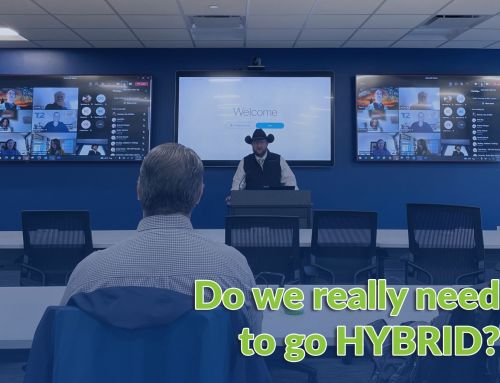A recent LinkedIn post caused me to pause. Of course, I can’t locate it now that I want to reference it but, in a nutshell, event planners were asked if in-person conferences were relevant enough to justify their impact on the environment. Many offered suggestions of how to lessen the impact. Go paperless or use reusable coffee cups. Donate leftover food to local shelters or include “active” networking like a morning run or afternoon walk instead of busing to entertainment. All great ideas for sure and ones we have put into practice for years. But do these actions really solve the overarching problem?
There was a particular answer from a seasoned event planner that struck me. She said (and I’m summarizing because, again, I can’t find the darn post), “Conferences are no longer relevant enough to justify the impact of the air travel alone and I find myself wanting to get out of the industry or plan virtual-only events.” In our world of everything-is-perfect-especially-on-social-media, I appreciated her candor on a subject that truly impacts her career and obvious social conscious.
I’m not ready to throw in the towel on in-person conferences just yet, but when I read the post, I got to thinking about how many conferences could be “virtual-only” and is that the way we should be consciously headed. I know there will be naysayers who say getting out of the office is good thing. Networking in-person is a good thing. Conferences break-up usual routines and are the catalyst for real change. I agree. There are lots of great things about conferences. But are those things enough to warrant the impact on our environment? Most climate change experts agree that even the “greenest” efforts do not outweigh the impact of air travel. For example, the vegan who only heats with solar power and rides a bike to work but still takes the occasional flight ends up not being very green at all. And since the airline industry does not seem to be changing its practices or at least changing at a rate that will make a difference in the near future, isn’t it up to us to make individual decisions to do better?

Daniel Mittler, political director of environmental NGO Greenpeace, proposes that fossil fuels need to be more expensive. That is a first step. But also “we need to move towards a more sharing and caring way of living on this planet,” he says. “We need a prosperity that is based on community and based on real wealth of collective vision, rather than one that is based on relentless consumption. Aviation is a symbol of the kind of consumption that we need to leave behind.” Perhaps most in-person conferences are as well.
As an event planner, this may seem like I’m proposing “cutting of the hand that feeds me.” But I disagree. I think of it as a challenge. Let’s, together, figure out which in-person conferences are necessary. Maybe increase the number of conferences that are held at multiple locations to lessen air travel. Let’s look at virtual conferences in a new light – maybe there will be more networking and we’ll hear from more voices than in-person conference. I haven’t been an event planner for all that long and I remember even four years ago when going completely paperless seemed unacceptable. Now, for us, it is the norm. I know we often don’t make the final decision. It’s up to our client. We do, however, hold the power to steer our clients. To inform them of the impacts, the choices and the solutions. Let’s do our part. Who’s In?
About the author:
Amy Lucke decided long ago, she would never stray far from the mountains and rivers of Montana. She loves sharing the outdoors with her two kids and spends most summer weekends in a 3-person tent with her four person family. She feels fortunate that she gets to write, create and collaborate with the smart and talented women of Meetings Northwest. Little known fact: She once traveled for 4 months on an around-the-world plane ticket.








